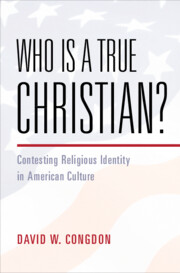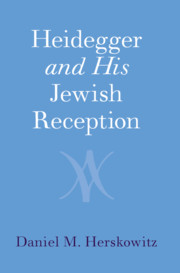1 - Modernizing the Rule
-
- Book:
- Who Is a True Christian?
- Published online:
- 04 January 2024
- Print publication:
- 22 February 2024, pp 43-82
-
- Chapter
- Export citation

Who Is a True Christian?
- Contesting Religious Identity in American Culture
-
- Published online:
- 04 January 2024
- Print publication:
- 22 February 2024

Heidegger and His Jewish Reception
-
- Published online:
- 24 September 2020
- Print publication:
- 08 October 2020
19 - Fundamentalist readings of the Bible
- from Part II - New Modes of Study of the Bible
-
-
- Book:
- The New Cambridge History of the Bible
- Published online:
- 09 June 2015
- Print publication:
- 13 April 2015, pp 328-344
-
- Chapter
- Export citation


